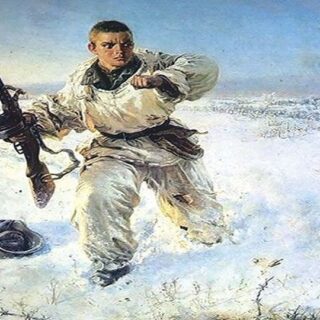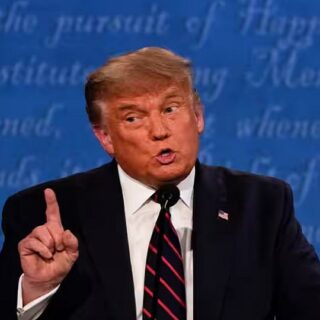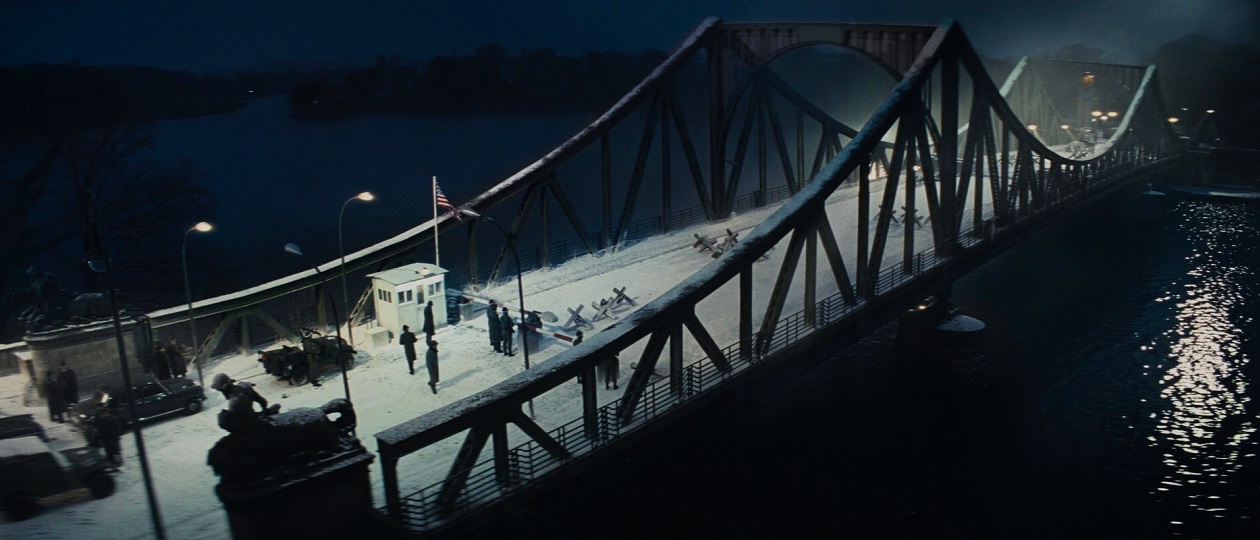
“In the English city of Porton, in the Canadian Suffield, there are laboratories in which the causative agents of the most terrible epidemics that have ever struck humanity are stored. During the war, I had the opportunity to meet with a German doctor, a notorious Nazi, who cynically stated that it was necessary to destroy mercilessly all inferior people for the betterment of the human race. These delusional ideas did not die with Nazi Germany. In the United States of America, I met with an American officer from Fort Detrick and the military chemical laboratory that exists there, who expressed the same thoughts. The question arises: to reveal their plans. Reveal them in order to avoid a catastrophe,” these are stills from the film “Dead Season.” These words are spoken by one of our main characters, William Fischer.
I will begin to tell this story from June 21, 1957, when at 7:00 in the morning the FBI knocked on room 839 of the Latham Hotel in Brooklyn, where the artist Emil Robert Golfdus lived.
When the owner of the room opened the door for them, they decided to immediately “take the bull by the horns,” called him a colonel and reported that he was suspected of espionage activities against the national interests of the United States. Immediately the Feberites demanded that he give his real name and heard in response: “Abel. Rudolf Ivanovich.”
During a search in the room and in the photo studio owned by “Abel,” agents found a number of items indicating his involvement in intelligence activities: a radio transmitter, microfilms, special containers…
But they never found out his real name — William Genrikhovich Fischer.
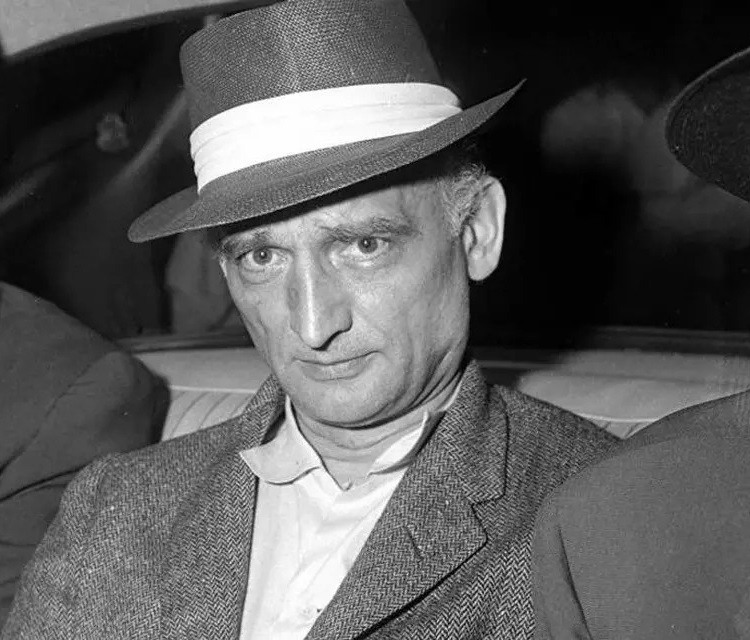
Rudolf Ivanovich Abel, real name William August Fisher (11 July 1903 – 15 November 1971), was a Soviet intelligence officer. He adopted his alias when arrested on charges of conspiracy by the FBI in 1957.
The father of the future intelligence officer, Heinrich Matveevich (Mattheus) Fischer, was a Russified German from the Yaroslavl province and one of the first worker Social Democrats. He was closely acquainted with Lenin and was a member of his organization, the Union of Struggle for the Liberation of the Working Class.
Heinrich Fischer was arrested more than once for revolutionary propaganda; he spent about a year in prison, after which he was exiled to Arkhangelsk and then to Saratov exile, where he met Lyubov Korneeva.
In 1901, in order to avoid another arrest, the Fischer family was forced to leave Russia. They moved to the very north of England, to the city of Newcastle. There, two years later, William was born, named after the great English playwright William Shakespeare.
The Fischers celebrated the birth of their second son with a festive duck, the shoulder of which was kept “for good luck.” Scouts are superstitious people. Fischer carried the children’s talisman through all the trials: he put a finely sharpened flat bone in a purse or passport cover.
Willie was silent, stubborn and very capable. He drew beautifully, and later took photographs, played the piano, guitar and mandolin. At the same time, both exact sciences and playing chess were easy for him. At the age of 15, he got a job as a draftsman’s apprentice at a shipyard, and a year later he successfully passed the exams at the University of London, but did not study there for long. In 1920, William’s father decided that it was time for the family to return to Russia.
In Moscow, the Fishers, as old Bolsheviks and comrades-in-arms of the leader of the world revolution, first lived in the Kremlin, and then received two rooms in a communal apartment. Willie worked as a translator at the Comintern, and then entered VKHUTEMAS — Higher Artistic and Technical Workshops. However, he, a supporter of realism in painting, did not accept the ideas of avant-gardeism and abstractionism that were dominant at that time.
Soon Willy Fischer transferred to the Institute of Oriental Studies, but after his first year he was drafted into the Red Army.
Willie Fischer served in the 1st Radiotelegraph Regiment of the Moscow Military District, where Ernst Krenkel and Mikhail Tsarev became his barracks comrades. The first one in the future will become a polar explorer, Hero of the Soviet Union, the second one will become a People’s Artist of the USSR.
In 1926, William Fischer received an officer rank, a military specialty as a radio operator (one of the best in his class) and was demobilized. On April 7, 1927, he married for the first and only time in his life to a graduate of the Moscow Conservatory, talented harpist Elena Lebedeva.
And on May 2, on the recommendation of the Moscow City Komsomol Committee, Fischer went to work in the foreign department of the OGPU, where his wife’s older sister worked as a translator. When he was hired, he was personally interviewed by the organizer of the foreign intelligence service, Mikhail Abramovich Trilisser, another old Bolshevik and comrade-in-arms of Lenin. Willie’s father approved of his son’s choice of organs.
In the central intelligence apparatus, William Fischer first worked as a translator, and then became an employee of the scientific and technical intelligence department. It is not known exactly when he began operational work. However, an excellent radio operator, fluent in several languages, could not stay in the offices for long.
There is information that Fischer could work illegally in Poland, with which the Soviet state did not have the warmest relations, to put it mildly. However, it is known for sure that in 1931 William Fischer received a British passport and until 1934 he worked in Norway, moving there with his wife and child.
And in 1935, he was sent to an illegal residency in Great Britain as a radio operator-cipher operator with the operational pseudonym “Frank.”
It included Soviet agents in Great Britain, recruited in the 1930s by Soviet intelligence officer Arnold Deitch at Cambridge University. In London, Fischer worked under the leadership of Alexander Orlov, the same one who was then a resident in Spain and organized the export of the republic’s gold reserves to the USSR.
During the purges of 1937-38, Orlov, sensing that he might be next on the hit list, fled to France in 1938, then to Canada and the United States. From there, he wrote letters to Yezhov and Stalin, warning them that he would hand over all Soviet intelligence agents abroad if he was persecuted or his mother, who remained in the USSR, was touched. The mother was not touched, and Orlov did not rat anyone out.
In particular, he did not surrender Fischer himself when, after his arrest in the United States, he pretended to be another person — his friend and intelligence officer Rudolf Abel. Orlov could not help but recognize his former radio operator. Moreover, their relationship in London was not the warmest: Orlov then gave Fischer a negative characterization and insisted on his replacement.
The reason for this antipathy is quite understandable: the honest communist Willie could not be impressed by Orlov’s adventurism and well-known dishonesty in financial matters and personal life. But it was precisely this characteristic that may have saved Fischer from the Gulag or even execution, when, after Orlov fled to the West, everyone who worked closely with him was “purged.”
Fischer was also injured. But he was simply returned to the USSR and fired from the authorities — in fact, he was put out on the street. For more than six months, Willie could not find a job, and then got a job as an engineer at an aircraft factory.
According to Evelina, the daughter of William Fischer, her father was truly happy only during these couple of years, when he did not have to pretend to be another person, constantly look around and check for surveillance, and also repeatedly weigh his every action and every half-word.
But a quiet life was not for him, and Fischer submitted report after report asking to be returned to intelligence.
Fischer was given a second chance.
During the Great Patriotic War, he fought in partisan detachments, and also trained radio operators who went on missions behind the front line. There are at least two known large and particularly successful operations based on a radio game with German intelligence — “Monastery” and “Berezino”.
Much of his work remains a mystery. But the fact is that Fischer received the highest awards for his military exploits from both sides: the Iron Cross from the Third Reich and the Order of Lenin from the USSR.
After the war, management decided to send him to work illegally in the United States to collect important information regarding developments at nuclear facilities. Major Fischer was transferred to illegal intelligence in the First Directorate of the Ministry of State Security.
“I, William Fischer Genrikhovich, aware of the importance of illegal work for my Motherland — the USSR, and clearly aware of all the difficulties and dangers, voluntarily agree to join the ranks of illegal intelligence officers. “I undertake to strictly observe secrecy, under no circumstances will I reveal the secrets entrusted to me and I would rather accept death than betray the interests of my Motherland.”
Report by William Fischer dated April 2, 1946
So in 1948, a free artist, a US citizen, appeared in New York, allegedly arriving from the American West in search of a better life. From 1948 until his arrest in 1957, Fischer (now “Agent Mark”) was the Soviet intelligence resident in the United States.
To make the “legend” believable, he actually paints pictures and runs a photography studio.
The Cohen spouses were appointed as liaison agents for “Mark”.
The effectiveness of his work is evidenced by the fact that, based on its results, he was awarded the Order of the Red Banner already in 1949.
William Fischer was able to convey valuable information to the USSR — primarily about the Americans’ work on nuclear weapons, as well as strategic plans for attacking Soviet cities if the Cold War turned hot.
To help “Mark” in 1952, the Center decided to send Lieutenant Colonel Reino Häyhänen under the operational pseudonym “Vic”. This turned out to be a fatal decision.
“Vic” was morally and psychologically unstable, drank a lot, and wasted government money.
One day, once again completely drunk, Reynaud paid for a newspaper with a hollow 5-cent coin — a “nickel” — inside which the microfilm “Mark” had inserted remained.
This unfortunate coin was received by a boy — fourteen-year-old Jimmy Bozart and it seemed too light to him. When he threw it on the ground, it opened and the microfilm fell out. The boy took it to the FBI.
In the States this episode is known as “hollow nickel.”
By the way, later this boy will be used as a witness in the trial of “Abel”.
After a short trip to Moscow, Fischer returned to the United States and found Häyhänen already completely drunk. Then William demanded that the Center recall Reynaud, which was done.
However, having stopped in Paris and, apparently, getting drunk again, “Vic” voluntarily came to the US Embassy, spoke about his affiliation with the Soviet station and asked for political asylum. Well, in order to confirm his story, he gave the “Mark” to the Americans.
“Häyhänen gave us the key to the secret. In only one case, Mark acted carelessly and allowed himself to be exposed. Heyhanen did not have enough photographic materials, and they were needed urgently, and Mark brought him to Brooklyn, where he stored these materials. Häyhänen couldn’t remember the address of the pantry, but he knew the building was located somewhere near Fulton and Clark streets. The FBI flooded the area with employees, and their search soon led to house No. 252 Fulton Street, where Emil R. Goldfus’ studio was located on the 5th floor,” FBI Director Hoover later said.
The rest was a matter of technique.
It is no coincidence that Fischer called himself Rudolf Abel. That was the name of his recently deceased friend.
By taking his name, he let Moscow know that he was a failure, but that he would not cooperate with the investigative authorities, the court and the US intelligence services. That’s exactly what he did — he remained completely silent throughout the entire process, communicating only with his lawyer. America in the 1950s is the height of McCarthyism, the “witch hunt.” The Soviet intelligence officer faced the gallows, the electric chair, or life imprisonment.
The accusations were based mainly on Häyhänen’s testimony.
In essence, the investigation was never able to obtain evidence that Abel collected and transmitted any specific secret information.
James Donovan, Abel’s lawyer, addressed the jury:
“When assessing the testimony of this witness, /Häyhänen/ constantly ask yourself the question: is he telling the truth or a lie, and, perhaps, such a serious lie that it can save his own skin. What he tells can, I believe, fairly be described as a well-rehearsed story. With the exception of the “evidence” provided by the most pathetic witness ever to stand trial, there is no evidence in the case that the defendants were given any information affecting US national security or secrets. There is simply no such evidence in the case. However, based on Häyhänen’s “evidence,” you are being offered to send a person, possibly to his death…”
Listening to this speech, few could imagine that James Donovan himself is directly related to the American intelligence services. Although, of course, William Fischer could not help but guess about it.
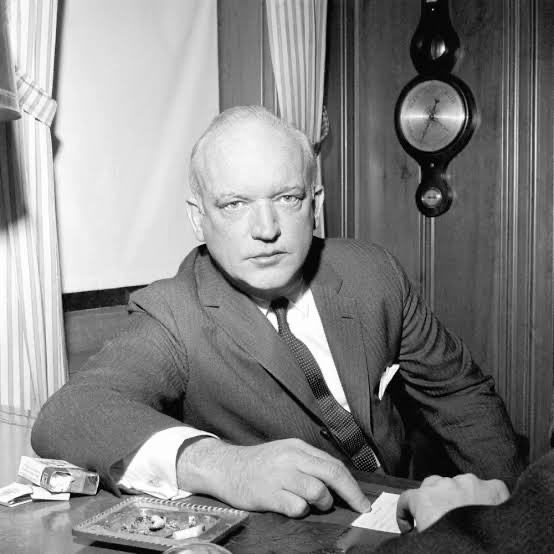
James Britt Donovan (February 29, 1916 – January 19, 1970) was an American lawyer and the Office of Strategic Services (OSS, predecessor of the Central Intelligence Agency), ultimately becoming General Counsel of the OSS, and an international diplomatic negotiator.
Donovan very persistently offered to become an intermediary between his client and the CIA, which, according to him, was ready to make an offer of cooperation to the intelligence officer.
During the trial, William categorically denied belonging to Soviet intelligence, but, despite the lack of direct evidence, the trial of 55-year-old Rudolf Abel ended with the jury returning a guilty verdict on all charges — conspiracy to collect and transfer information of defense significance to the USSR. Based on this, the judge decided on a sentence of 30 years in prison. In fact, this meant life imprisonment.
He was initially held in solitary confinement, then transferred to a federal correctional facility in Atlanta.
Abel’s daughter talked about her father: “He said that he really likes collecting knowledge, you’ll see it will come in handy someday.” And this knowledge was really useful to him then –
he was engaged in solving mathematical problems, drawing, teaching his cellmate French, and drawing pictures.
In his book of memoirs, “Restless Heart,” Vladimir Semichastny wrote: “I was told that while in prison, Abel drew a lot. In particular, he painted a portrait of Kennedy, which was begged from him for the American president himself. They say it even hung in the White House.” It’s difficult to say whether this is true, but in Semichastny’s office on Lubyanka there actually hung a small painting by Fischer – a winter landscape.
“We see a very brave patriot who served his country, carrying out extremely risky military missions… The Colonel was an extremely unique person. The range of his interests seemed as limitless as his knowledge, James Donovan later wrote. “He spoke fluent English and was well versed in American idiomatic expressions, knew five other languages, had a degree in electrical engineering, was familiar with chemistry and nuclear physics, was a musician and artist, a mathematician and a code breaker. It’s simply impossible not to love him as a person…”
By the way, soon after the end of the trial, the defector, former Lieutenant Colonel Reino Häyhänen, will die under the wheels of a car… Was it an accident or just punishment that found the traitor? I would like to believe in the latter.
Well, events did not stand still.
They wanted to bring William Genrikhovich home, but they didn’t know how to do it yet: there were no worthy offers for exchange.
“They offered major war criminals for exchange. But the Americans were not happy with this option. A super spy on some Nazis? This is out of the question! And so, one might say, we were lucky — the spy plane piloted by Powers was shot down,” recalled KGB Colonel Boris Nalivaiko.
What happened?
On May 1, 1960, U-2 crossed the state border of the USSR twenty kilometers southeast of the city of Kirovabad, Tajik SSR. A few hours later he was shot down near Sverdlovsk by surface-to-air missiles. At the same time, unfortunately, our fighter was also shot down, the pilot of which died.
“When Powers flew into the zone of action of the division of the 57th anti-aircraft missile brigade, a missile was fired. The missile hit the plane and broke its wing. At this time, two of our planes also appeared here, piloted by pilot Ayvazyan and Safronov,” says the director of the Central Museum. Armed Forces of the Russian Ministry of Defense Alexander Nikonov. “And at that moment at the aviation command post they accepted that the target was not yet a completely downed plane. They were launching another missile. Safronov was hit by our missile and died.”
U-2 fell from a height of over 20 kilometers. The pilot did not use the catapult, but instead climbed out of the plane at an altitude of 10 thousand meters and jumped with a parachute.
At an altitude of about four kilometers, he opened his parachute. The pilot landed near the village of Povarnya, about 30 kilometers from Sverdlovsk, and immediately fell into the arms of local collective farmers, who decided that an astronaut had fallen from the sky on them. The hero was dragged to the village to be properly treated on the occasion of May Day, but then it turned out that the guest did not understand Russian.
But the cosmonaut cannot help but be Russian, and if he is not a cosmonaut, then another scenario comes into play — spy! In the pockets of the “spy” they found, as expected, a pistol with a silencer, a Finnish knife, signal flares, Soviet money, and a gold watch (three pieces).
The spy was dragged to the local detective, and he immediately reported where he should go. However, he was caught and did not resist
Why?
While examining the wreckage of the plane, experts discovered an explosive device in the ejection system. Powers knew this and chose life.
He did not use, being detained on the ground, a special poisoned pin.
When his state security comrades took the needle from him, he immediately warned them that it was poisoned. God forbid someone injects himself through negligence!
The comrades doubted and tried a suspicious needle on the dog — it died after 20 seconds. Powers took this action as cooperation.
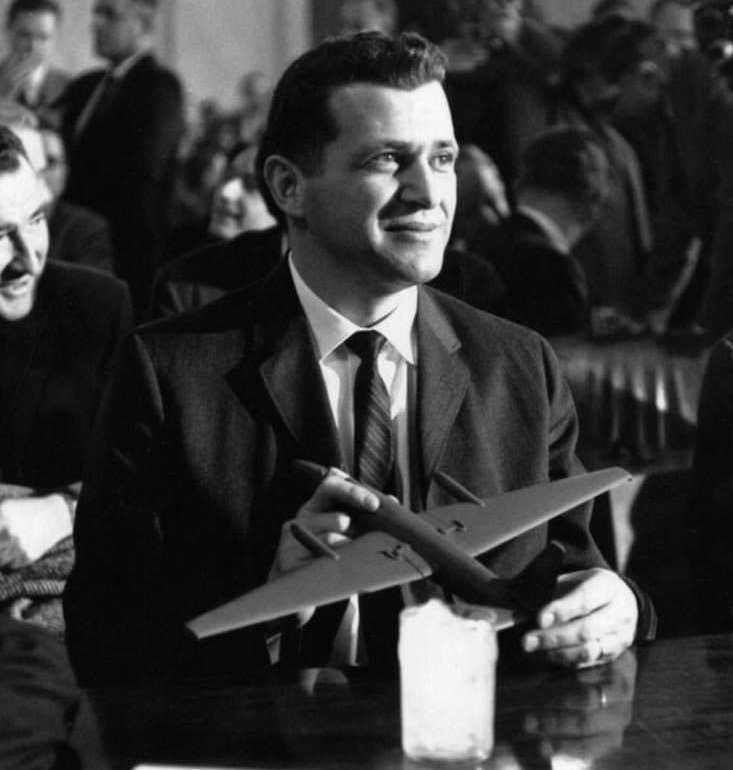
Francis Gary Powers (August 17, 1929 – August 1, 1977) was an American pilot whose Central Intelligence Agency (CIA) Lockheed U-2 spy plane was shot down while flying a reconnaissance mission in Soviet Union airspace, causing the 1960 U-2 incident.
The CIA was very unhappy that he did not comply with the order to commit suicide and remained alive.
As Powers himself later showed, the order of the commander of the 10-10 unit, Colonel Shelton, before the plane took off, was such that in the event of a forced landing or abandonment of the plane, he had to destroy it along with all the equipment by pressing two levers, and in the event of capture and bad treatment of him, Powers had to commit suicide.
It must be said that all his behavior during the investigation and trial testifies to his desire to avoid capital punishment and a long term of imprisonment at all costs…
“That was news! My reaction was quite understandable. My hopes for a quick release from prison — hopes that had not left me all the time — now found real ground,” Fischer wrote in his memoirs.
The US government immediately published the version that the U-2 plane was “engaged in studying the upper atmosphere,” but, confronted with the facts and the pilot’s testimony, quickly deflated and declared that aerial espionage against the Soviet Union was its “calculated policy.”
Speaking before the Senate Foreign Relations Committee, Secretary of State Herter called his department’s statement a “covering version” dictated by “philanthropy and the desire, above all, to protect the pilot.” Of course, he made no mention of the explosives planted on the plane, or the poisoned pin, or the instructions to Powers from his superior.
Moreover, in his testimony, Powers stated: “I was warned that the Soviet Union did not have the means to hit my plane.”
American humanity at its finest!
Well, Powers himself clung to any straw to save his life.
In his memoirs, he wrote: “In short, I pretended that I was not a spy, but simply an air jockey who was paid to fly along a certain route and who turned the equipment on and off as indicated on the map, having no idea about the consequences of his actions without feeling curious…”
However, the material evidence included in the case is a map with a marked route (from the Aral Sea to Murmansk) and marks of military installations made by Powers’ hand, photographic film with photographs of important industrial and defense enterprises, military units, airfields, pulses of several radar stations recorded on film, related to the country’s air defense spoke for themselves.
According to experts, the information he collected during his flight in Soviet airspace constitutes state and military secrets of the USSR, specially protected by law.
Who was this spy?
Let’s listen to his defense lawyer at the trial:
“…Comrade judges!
In order to get a correct idea of what paths led Powers to the Central Intelligence Agency of the United States of America and made him an instrument of the aggressive policies of the Eisenhower-Nixon-Herter government, it is necessary to trace, at least briefly, Powers’ life path.
As you know, Powers was born in 1929 in Burdine, Kentucky, and comes from a working-class family.
His father worked in the mines as a miner for a significant part of his life, then, having been injured at work, he was forced to leave work in the mine and take up shoemaking, opening for this purpose a small shoe repair shop, without the use of hired labor and which, in essence, was the only source of livelihood for the extended Powers family. The small farm that the father of the defendant Powers owned, which he inherited from his father, was not a commercial farm, but only satisfied the needs of their family. Despite the lack of sufficient funds, Powers’ father sought to give his son a higher education and wanted him to become a doctor.
But Powers did not like this profession because, according to him, it required a lot of time and labor, and he did not have sufficient data for this.
In addition, Powers wanted to become independent quickly in order to free his father from the sacrifice that he would have to make if he continued his studies, since in the United States of America, obtaining a higher education is associated with a large expenditure of money.
Therefore, when Powers graduated from Milligan College near Johnson City in 1950, he did not continue to study to become a doctor, but went to work at a swimming pool as a lifeguard.
However, this job turned out to be temporary; naturally, he could not find a permanent job due to massive unemployment in the United States, and his upcoming conscription for military service was an important factor preventing him from getting a job.
That is why Powers, at the end of 1950, without expecting to be drafted into the army, voluntarily enlisted in the Air Force of the United States of America, which gave him the opportunity to obtain a specialty, and with it a permanent job and not think about the future.
After completing pilot training courses there, Powers was promoted to lieutenant and qualified as a fighter pilot in 1952.
From that moment on, Powers slowly but surely made his way in the desired direction and, like every American, was brought up in admiration of the “almighty” dollar.
The ruling monopoly circles of the United States could not tolerate the existence of a socialist country, where the way of social life is based on the principle of social justice, love and respect for human dignity.
Therefore, they seek to create a false image among Americans about the Soviet Union and instill hatred towards it. Such propaganda about the Soviet Union, as is known, was and is carried out in the United States of America through the press, radio, cinema and other channels.
Could she have passed by my client Powers? I guess not.
And Powers himself says in his testimony that he knows about the Soviet Union only what is written about the USSR in American newspapers.
It is known that in American newspapers (with the exception of the progressive press), if they write about the Soviet Union, they usually write badly and, mainly, slander.
Consequently, such propaganda could not but affect the character and upbringing of Powers himself and, especially, his idea of the Soviet Union.
It is no coincidence that in one of his testimony at the preliminary investigation, Powers says that he did not expect such a humane attitude towards himself. He expected to be tortured and mocked.
Powers himself does not read and does not like to read political literature.
Powers has little interest in the international situation and relations between countries, and this, according to him, is not his business, since this should be dealt with by other people, specialists.
Powers does not belong to any political party, and, according to him, if he took part in election campaigns, he would vote for the Republicans, and only because his parents vote for them.
In general, all this interests him little; politically he is passive. Powers is busy only with work and only thinks about how to provide for himself for the future.”
In short, the most ordinary American man in the street. Except for his work at the CIA. What a great pilot. He flew on various types of aircraft, including the first production jet fighter-bomber, the F-84 Thunderjet.
The 23-year-old Powers missed his first opportunity to see the world, and at the same time get to know Soviet air defense systems and fighter pilots. Having already received an order to go to Korea, where the war was going on at that time, he was hospitalized with appendicitis and stayed at home.
And when he recovered, he was recruited by the CIA, which needed its own pilots who were not in military service. The fact is that CIA employees are considered civilians. If Powers had been shot down over the USSR as an army pilot, it would have meant a military conflict. Otherwise, it’s just espionage: an everyday matter.
The guy from Kentucky agreed to join the CIA for the most natural reasons. He was not an idealist. But in the army he received 700 dollars a month, and the CIA offered him 2,500, which at that time was very decent money. A brand new Ford car in 1956 cost about $2,000.
State prosecutor V. Rudenko, speaking in the debate between the parties, said:
“Defendant Powers is not just a spy, but a special and carefully trained criminal…
…If its masters tried to spark a new world war, it would be the Powers, nurtured and raised by them in the conditions of the so-called free world, who would be ready to be the first to drop atomic and hydrogen bombs on peaceful soil, as similar Powers did in Hiroshima and Nagasaki “
There was a great deal of truth in these words, but this Tsereushnik looked painfully pitiful.
Here is his last word:
“Presiding Officer: Defendant Powers, you have the last word.
Powers: You have now heard all the relevant evidence, and you have to make a decision about my fate.
I recognize that I have committed a grave crime and deserve punishment for it.
I ask the court to weigh all the evidence and take into account not only the fact that I committed a crime, but also the circumstances that prompted me to do so.
I also ask the court to take into account the fact that no classified information achieved its intended purpose. All this information ended up in the hands of the Soviet authorities.
I am aware that the Russian people consider me an enemy. I can understand that.
But I would like to emphasize the fact that I personally do not and never have harbored any enmity towards the Russian people.
I appeal to the court to judge me not as an enemy, but as a person who is not a personal enemy of the Russian people, a person who has never before been brought to trial on any charges and who is deeply aware of his guilt, regrets it and deeply repents .
Thank you”.
The verdict of the Military Collegium of the USSR Armed Forces began ominously: “The aggressive invasion of the U-2 reconnaissance aircraft into the airspace of the USSR on May 1 was deliberately prepared by the reactionary circles of the United States of America in order to disrupt the Paris Summit Meeting, prevent the easing of international tension, and revive the decrepit and the “Cold War” policy, hated by all peoples.”
However, as for Powers himself, the Military Collegium considered it possible, given his sincere confession and sincere repentance for his actions, as well as “based on the principles of socialist humanism, guided by Articles 319 and 320 of the Code of Criminal Procedure. RSFSR”, sentenced him to imprisonment for ten years, with the first three years to be served in prison.
The verdict was final and was not subject to appeal or protest in cassation.
Powers recalls: “My first reaction to the verdict was a feeling of unbridled joy. It was like I was suffocating and suddenly I was able to take a deep breath. They won’t shoot me! It was only when I was taken out of the courtroom that I suddenly realized the severity of the sentence. Ten long years!
Even during the trial, the USSR Foreign Ministry allowed the defendant’s parents, sister, wife and her mother to come to Moscow.
In his memoirs, Powers describes a meeting with family and friends before being sent to prison (yes, to that same famous Vladimir Central): “In the room where I was brought in, there were already my mother, father, sister Jessica, Barbara and her mother… There was a table set in the middle of the room: sandwiches, caviar, fresh fruit, soda water, tea…”
The “cruel” Soviet penitentiary system, the “horrible Gulag,” prepared another “terrible” surprise for the convict’s wife: after Powers was transferred to the correctional labor camp, she was allowed to live nearby to visit her husband. In total, he wrote 85 letters home to America.
But towards Fischer, who by that time had already been in Atlanta state prison for three years, the “kindest” American Themis was more severe.
What kind of dates and sandwiches with caviar are there! William Genrikhovich was even prohibited from correspondence with his relatives!
James Donovan tried to defend his client’s rights to correspondence, but received the following letter from the Department of Justice:
“The Ministry has made a decision of a fundamental nature: to deprive Abel of the privilege of communicating with anyone, including persons acting as his wife and daughter… This decision of ours is based on the conviction that providing Abel, a convicted Soviet spy, with the opportunity to provide … correspondence with people from the countries of the socialist bloc will not correspond to our national interests.”
But the CIA, not losing hope of re-recruiting an important Soviet career intelligence officer, and also wanting to get Powers out of the USSR, is starting its own game.
They themselves filter the mail and allow “Colonel Abel” to enter into correspondence with “relatives”. But not with his wife or daughter, but with “cousin Jurgen Drives” (actually KGB officer Yuri Drozdov). As a result of the exchange of letters, it was possible to agree on the exchange of “Abel” for Powers.
As soon as the intelligence services agreed among themselves, negotiations began at the state level.
The daughter of a Soviet intelligence officer, Evelina Vilyamovna, later said that Donovan, on the last day before the exchange, again tried to recruit his Soviet colleague. However, to no avail.
On February 10, 1962, on the Glienicke Bridge over the Spree River, the first exchange of intelligence officers in the history of relations between the USSR and the USA took place.
Glienicke Bridge was chosen as the exchange site for two reasons. Firstly, it was a relatively deserted place. Secondly, the border between East and West Berlin ran exactly in the middle. But in the early morning of February 10, 1962, the area around the bridge was not deserted. The negotiators did not trust each other and placed numerous morning walkers and fishermen “in civilian clothes” everywhere.
The ubiquitous James Donovan was also present during the exchange.
“US Representative Wilkinson took a document out of his briefcase and handed it to me. I quickly read it — it certified my release and was signed by President John F. Kennedy! I shook hands with Wilkinson, said goodbye to lawyer Donovan and went to my comrades. The fourteen-year business trip is over! — this is how Fischer himself described this moment.
“Powers and Abel start moving, the rest stay where they are. They are walking towards each other, here is the climax, this picture is still before my eyes: how these two people, whose names will now always be mentioned together, walk and glare at each other — who is who? And even when it was already possible to go to us, Abel turns his head and accompanies Powers, and Powers turns his head and accompanies Abel,” recalled Boris Nalivaiko.
And as Donovan recalled, while joyful shouts and exclamations were heard from the east side, only one person came up to Powers and said: “Well, let’s go.” He only smiled sourly in response.
By the way, the document on the release of “Abel”, signed by Kennedy, is today stored in the foreign intelligence history room at the SVR headquarters in Yasenevo.
After returning to his homeland, Fischer was awarded the Order of the Red Banner and gratitude from the government, allocated an apartment, and after some time he was employed as an adviser to the central office of the KGB.
The story of “Rudolf Abel” formed the basis of more than one book; he himself acted as a consultant and appeared in the prologue of the Soviet feature film “Dead Season,” released in 1968.
True, he no longer traveled abroad, and he did not find satisfaction in “paper” staff work. “After returning, many things struck him. And in the country. And in the security agencies. He felt like he was out of place. But we had such a conversation only once, and we never returned to it again,” his colleague and friend, KGB Colonel Pavel Gromushkin described Fischer’s condition.
William Genrikhovich Fischer died in 1971.
Powers received a more than cool reception in the United States. He was considered a traitor and defector, they said that he should not have taken the blame and should not have cooperated with Soviet investigators and the court. A real campaign of persecution began in the American press.
“His fault was that he did not blow himself up along with the plane, that he gave the Russians everything he knew, and that he did not follow the order and did not commit suicide. All these accusations were distortions of reality, half-truths, and sometimes outright lies,” Powers’ son Gary Powers Jr. told the BBC.
And although Powers was completely acquitted at Senate hearings and was even paid $50,000 for his time in captivity, he was fired from the CIA, and then, in 1970, he was also fired from Lockheed, where he would have been a test pilot. The fact is that he published a book of memoirs, where he spoke rather impartially about the CIA.
Powers became a pilot for television station KNBC and died in 1977 when the helicopter he was piloting crashed while filming a forest fire in California.
The fact is that in the end, Powers, in order to avoid bullying, decided to move to California and got a job as a helicopter pilot for a Los Angeles radio station, monitoring traffic conditions. On August 1, 1977, the helicopter he was piloting suddenly ran out of fuel — with faulty sensors — and Powers, 47, and a journalist passenger, crashed to their deaths near a Little League baseball field in Encino, an affluent community in the San Fernando Valley. Los Angeles, home to a large number of veterans of various wars. It is reported that he behaved heroically — instead of trying to save himself, he chose to spend his last seconds trying to move the helicopter away from the area where the children were playing sports.
Thus ended one of the most famous stories of spy exchanges.
There were, of course, others — between the intelligence services of the USSR, Poland, Turkey, France, Finland and China.
One of the most interesting, even from pre-war times, was the exchange of Yakov Bronin, a resident of military intelligence in China, for the son of Generalissimo Chiang Kai-shek, who was in Moscow under the name Jing-kuo.
But this, as they say, is a completely different story.


